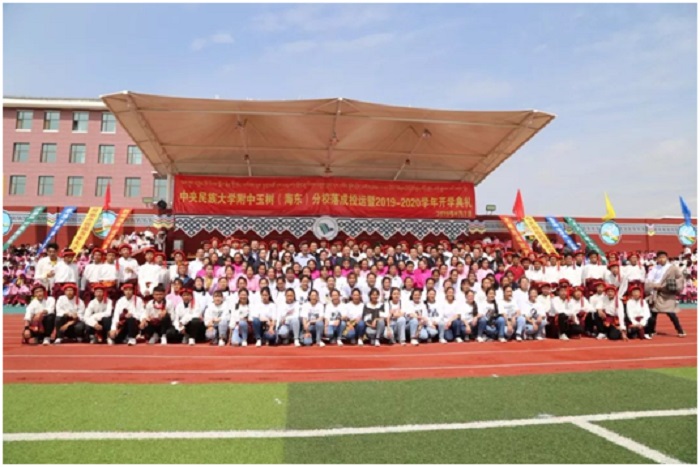



After graduation from Northwest Normal University (NNU), Northwest China’s Gansu Province in 2019, Zhao Zhanzhan went to Qinghai Province and became a teacher of the Yushu (Haidong) campus of the High School Affiliated to Minzu University of China.
According to her, the past year was in some way lonely and perplexing, but it was more about growth and harvesting. She said she has no regret for her choice, and feels happy to be needed by the students there.
Zhao volunteered to teach in Aksu prefecture, Northwest China’s Xinjiang Uygur Autonomous Region, during the summer vacation of 2017, and it was this experience that inspired her to become a teacher.
Xinjiang’s education department signed an agreement on volunteer teaching with the NNU in 2008 to alleviate the shortage of teachers in the autonomous region, promote educational reform of the institutions of higher learning, and expand the employment market for college students. In the past 12 years, hundreds of NNU students volunteered to teach in Aksu each year. So far, the program has been joined by a total of over 4,000 college students.
“We taught math, Chinese and English as there weren’t enough teachers, and sometimes we also cleaned classrooms and canteens, as well as took care of the students when they were dining and sleeping,” Zhao introduced. Such close contact with the students gained Zhao and her partners a deep bond with the students. The notes given to her by the students when she left the prefecture, which carried wishes and attachment, sowed a “seed” in Zhao’s heart that later guided her to join the education cause.
“What I learned in my alma mater ignited my dream to become a teacher and also firmed my conviction,” Zhao told the People’s Daily, adding that it’s also natural for her, as one from the Tibetan ethnic group, to choose to teach in Qinghai, where Tibetans constitute around a fifth of the population.
The Yushu (Haidong) campus of the High School Affiliated to Minzu University of China where Zhao teaches is a new school that just started recruitment two years ago. All the students are from Qinghai’s Yushu Tibetan autonomous prefecture, and many of them do not have excellent academic performance as their parents are mostly shepherds. Besides, they don’t speak good Chinese, so they often fail to follow what the teachers say on classes. Therefore, Zhao specially lowered her speed and used both Tibetan and Chinese languages to ensure that she’s fully understood by the students.
“The average age of the teachers of our school is only 26, and they are graduates of Beijing Normal University, Shaanxi Normal University, NNU, and Northwest University. Twenty more teachers are expected to join us in the following months of this year. They are our most precious treasure,” said Ma Zhaohui, vice principal of the high school.
For Zhao, her students are optimistic, forthright, upbeat and passionate.
“I still remember the weariness after travelling 7 hours on a road surrounded by the vast grassland on my first home visit to a student,” Zhao told the People’s Daily. “However, when I arrived at the student’s home and was served with a cup of hot milk tea by the student’s parents, all my fatigue vanished. The feeling of being needed is able to cure everything,” she said. Though often vexed by the naughty students, Zhao still has glittering eyes every time she speaks of them.
“They always give me dried beef, tsampa (roasted barley flour), and lollipops they brought from home when I inspect their dormitories. Though for most of the times I would politely refuse them, I would never forget the expression in their eyes that reflect their genuine desire to share,” Zhao said, adding that she’s the one that can’t leave the students, not the other way around.
“Though the living conditions here cannot compare to those in the cities, the infrastructure is great and it’s convenient to live here. Most importantly, I’m not merely earning a living; I love what I do and feel proud to contribute my strength and find my value. That’s invaluable,” she said.
In recent years, more and more college graduates like Zhao are flocking to Qinghai, and the province has also rolled out a series of measures to encourage them.
According to Wu Guoqiang, deputy head of the Organization Department of the Communist Party of China Qinghai Committee, the province has introduced more than 2,200 professionals to work temporarily there, who helped train over 120,000 people. Last year, 63 enterprises in the province recruited more than 1,200 college graduates, 84.3 percent of whom have master’s degree.
“Go out of the campus, to observe, work and expand your capability.” That’s a line shared by Zhao with one of her schoolmates who is about to work in a middle school in Qinghai two months later.
“I believe our team will continue to grow,” Zhao said, with full confidence for the future.


The Humanitarian Service Diamond Awards has.
A Chinese Company, Inner Galaxy Steel.


The Programme Coordinator, Regulatory, Compliance and.


A Non-Governmental Organization (NGO), Committee for.
The Trustfund Pensions Limited has chided.


The House of Representatives Committee on.
The China General Chamber of Commerce.


Senator Chuka Utazi who represented Enugu.


An Abuja based Legal Practitioner, Ugochukwu.


The African business community in Yiwu,.
Leave a Comment